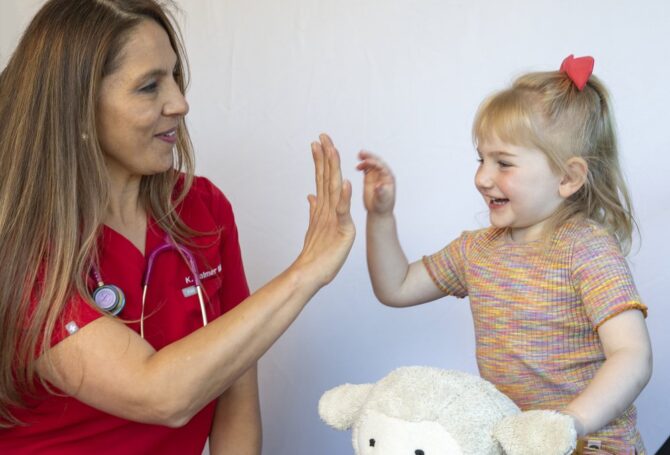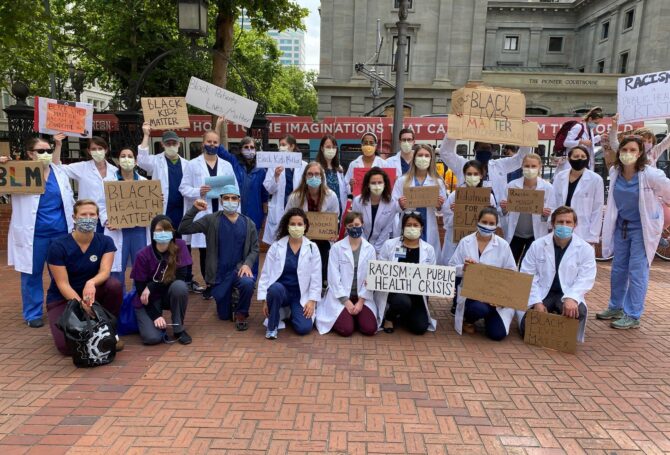
July 21, 2022
Kara Connelly, MD, is a pediatric endocrinologist and the medical director for OHSU’s Doernbecher Gender Clinic, a comprehensive and interdisciplinary clinic that is a part of the OHSU Transgender Health Program. The clinic serves patients across their lifespans with specific attention to patient goals, from primary care to complex affirming surgeries.
In this Q & A, Dr. Connelly describes what inspired her interest in gender-affirming care; lessons learned from her patients and families; and ways that child health providers can better care for gender diverse youth.
Q: How did you become interested in gender-affirming care, and what was your journey to gaining experience and expertise in this area?
I saw my first gender diverse patient while training as a fellow in Pediatric Endocrinology. I was so inspired by her story and recognized the significant barriers she and her mom faced in trying to access the care she needed. Once on gender-affirming medications, she thrived, and I found such joy in getting to be a part of her journey. When I graduated from fellowship, I recognized that this was a growing community and that there was a need to both streamline gender-affirming care and build a team of experienced medical and mental health providers to better provide this care. I have gotten excellent support from other providers and gender care centers, and I have learned a great deal from emerging research.
Q: What are some of your biggest takeaways from your gender diverse patients over the years?
A major takeaway is seeing how incredibly talented our youth are. We have patients who are skilled in the arts – drawing, painting, theater, choir – which affords our clinic a small, but growing, gallery of patient artwork.
We often hear about the serious concern for the mental health experiences of gender diverse youth, as well as their increased risk for being targeted by violence and discrimination. This is important information to pay attention to, especially in the current times where their rights are under attack and their existence has become political. Our youth are certainly worried about whether their care – and access to affirming adults — will be taken away. They worry about their friends living in other, more hostile states, or whether their own caregivers will be targeted for supporting them.
However, these youth continue to survive and thrive, even under these scary circumstances. Even more, youth are doing the work to expand the understanding of gender for all of us. In addition to their artistic talents, I have witnessed that youth and their families are also gifted leaders, dedicated to advocating on behalf of one another. In doing this, they regularly engage in activism with their schools, faith communities, and local political figures and policy makers.
We all have a gender identity and can benefit from a more expansive understanding of what gender is and can be. Gender diverse youth and their supportive adults will not fade into the shadows quietly. As adults and care providers, we have the responsibility to help these youth get to adulthood safely and with the ability to focus more of their energy on their other life goals, instead of trying to convince us that their identity is valid.
Q: Have your patients told you anything about what they want their health providers to know?
The heavy parts of seeking gender-affirming care
Youth often feel frustrated when they have to come into a medical environment and talk about their identity and bodies, while witnessing their classmates experience an affirming puberty process that doesn’t involve anyone else. Some of these decisions, such as preserving fertility, can feel understandably heavy. Many youth may express sadness and anger about having to decide about how they want to be a parent in 15-20 years, while their peers are worrying about what to wear to an upcoming party.
The need for open dialogue & competent care
While many young people don’t have considerable interaction with medical systems outside of annual checkups, youth are perceptive, and they are aware of the experiences of adults facing discrimination in care or inadequate care. There are also some primary care providers who won’t refer to specialty clinics or provide gender-affirming care themselves, because they don’t agree with it. When a young person hears these stories or has these experiences, it can lead to a distrust of medical providers. As health providers, we need to ensure we are creating a space for open dialogue, while also feeling confident in our ability to respond appropriately when a young person discloses. This includes being aware and ready to direct the youth to available resources, as well as being conscientious about moving at the young person’s pace and allowing their choice and autonomy.
The importance of goal setting support
Patients have often expressed the importance of PCPs helping identify goals and a pathway to reach them. This includes actively involving the youth in any referral processes, such as to a specialty gender clinic. We often get young people who say, “I don’t know why I was referred. I came out to my doctor and they sent me here.” It’s important that medical providers understand that anyone can be an affirming provider and engaging in open dialogue is an important step.
Q: What are a few actionable steps that child health providers can take to increase both their confidence and competence in caring for gender diverse kids?
- Reflect on your own gender identity, beliefs you have about gender and what it is/can be, how your gender identity (or these assumptions other people make about it) has limited or liberated you
- Introduce yourself with your name and pronoun, always, not just with gender diverse patients
- Work with your clinic teams to review clinic forms and info sheets, and revise with more gender neutral affirming language
- Listen to the Camp Wild Heart podcast
- Listen to this episode of The Laverne Cox Show: Moving Beyond the Gender Binary with ALOK
- Read the UCSF Transgender Guidelines
- Visit the OHSU Transgender Health Program website
- View free webinars on a variety of topics related to gender-affirming care from the National LGBTQIA+ Health Education Center



